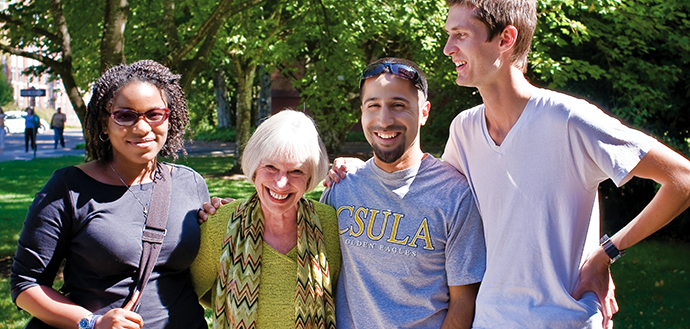
“It is my wish that all women and men will have the right, resources, and ability to chose whether or not to have children; to remain free of diseases associated with sexuality; and to understand and enjoy their own sexuality.” Marie Harvey has lived these values in her distinguished career as researcher, teacher, and mentor. She is a voice for women, for couples, for the underprivileged and those at risk.
Her dedication to the field of reproductive health was recognized by the American Public Health Association, which recently awarded her the prestigious Carl S. Schultz Award for Lifetime Achievement, placing her among a worldwide honor roll of experts. Proud and humbled, Marie defers the accolade. “I am surrounded by creative researchers and students who are young, smart, brave, who are pushing the envelope, thinking outside the box, sharing their ideas, and finding solutions. I’m not sure who mentors whom.”
Throughout her career, she has focused on the reproductive health of women. She began her work on the frontlines as a social worker and family planning counselor. Observing and treating the consequences of unwanted children, she was inspired to return to school in the field of public health and undertake research with the goal of contributing to the prevention of unintended pregnancies. With the HIV/AIDS epidemic in the 1990s and the emerging female face of the epidemic, Marie’s work evolved to focus on both pregnancy and disease prevention, and she began groundbreaking research focused on understanding the influence of relationship dynamics on couples’ protective behaviors.
Today, Marie is chair of the college’s Department of Public Health and an active researcher leading three projects. The Project on Partner Dynamics is a five-year longitudinal study funded by the National Institutes of Health to discover the impact of relationship factors (such as communication, commitment, relationship power, and decision making) on risky sexual behaviors in young women, men, and couples. “It takes two to tango, two to prevent the transmission of STIs [sexually transmitted infections], and only couple studies can fully address issues involved in understanding the relative influence of each member of a sexual dyad,” says Marie, who shares old Sufi that captures this concept:
You think you understand Two
Because you understand One and One
But you must also understand And
More than 500 men and women in the Los Angeles area are being interviewed four times over a one-year period. The study includes Latinos, whites, and African Americans at increased risk for HIV. Marie is dedicated to ensuring that the field staff for this project represent the diversity of the community being studied. “We have individuals from the community recruiting participants and conducting the interviews. As a researcher, I know that this helps insure the integrity and reliability of the information collected.”
Marie’s research team, including co-investigator Ann Zukoski, is ≠currently implementing two research studies in rural Oregon. The CDC-funded study, Proyecto de Salud para Latinos, the Latino Health Project, is exploring how issues such as racism, poverty, health literacy, and culture impact Latinos’ access to and use of reproductive health services in rural Oregon. “Most research and prevention has focused on urban Latinos, but with the dramatic growth of Latinos in rural Oregon, we simply must understand the social and contextual issues that increase the health disparities for this population,” she says. Findings will be used to create programs, improve services, and develop health policies and systems to address the reproductive health of Latina women who experience twice the rate of unintended pregnancies as non-Latina white women.
Marie’s third project is focused on Latino men who are living in rural Oregon. “Oregon is a new settlement area,'” explains Marie, “and rural areas are experiencing rapid and unprecedented growth in the number of new Latino immigrants.” These newcomers are mainly men coming from rural Mexico and arriving alone, without female partners or family members. They are settling into rural communities unaccustomed to diverse populations and face unique challenges, such as discrimination, difficulty accessing health services, and social isolation. “Our research team includes Latino men doing one-on-one interviews so we can better understand who is engaging in risky behaviors and what the barriers are to services. Our ultimate goal is to take our findings back to communities and develop culturally specific programs, services, and interventions designed to prevent STIs, including HIV, and unintended pregnancy among Latinos in rural Oregon.